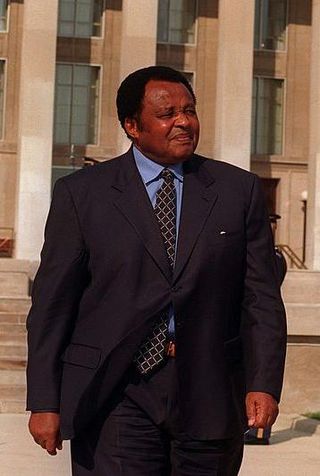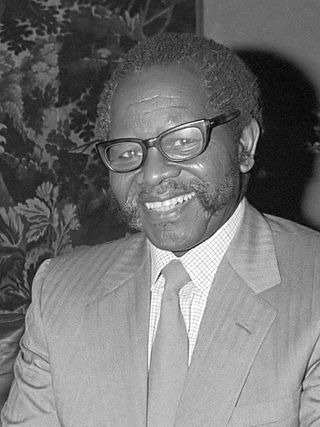Related Research Articles

The South African Communist Party (SACP) is a communist party in South Africa. It was founded in 1921 as the Communist Party of South Africa (CPSA), tactically dissolved itself in 1950 in the face of being declared illegal by the governing National Party under the Suppression of Communism Act, 1950. The Communist Party was reconstituted underground and re-launched as the SACP in 1953, participating in the struggle to end the apartheid system. It is a member of the ruling Tripartite Alliance alongside the African National Congress and the Congress of South African Trade Unions (COSATU) and through this it influences the South African government. The party's Central Committee is the party's highest decision-making structure.

The New National Party (NNP) was a South African political party formed in 1998 as the successor to the National Party (NP), which ruled the country from 1948 to 1994. The name change was, in part, an attempt to distance itself from its apartheid past, and reinvent itself as a moderate, mainstream conservative and non-racial federal party. The attempt was largely unsuccessful, and in 2005 the New National Party voted to disband itself.

The Democratic Party (DP) was the name of the South African political party now called the Democratic Alliance. Although the Democratic Party name dates from 1989, the party existed under other labels throughout the apartheid years, when it was the Parliamentary opposition to the ruling National Party's policies.

The National Assembly is the directly elected house of the Parliament of South Africa, located in Cape Town, Western Cape. It consists of four hundred members who are elected every five years using a party-list proportional representation system where half of the members are elected proportionally from nine provincial lists and the remaining half from national lists so as to restore proportionality.

Johannes "Joe" Modise was a South African political figure. He helped to found uMkhonto we Sizwe, the military wing of the African National Congress, and was its longest serving Commander in Chief, deputised at different points in time by Joe Slovo and Chris Hani. Modise headed MK for a 25-year period, from 1965 to 1990. He served as South Africa's first black Minister of Defence from 1994 to 1999 and led the formation of the post-independence defence force.
Charles Nqakula is a South African politician who served as Minister of Defence from September 2008 to 2009. He also served as Minister for Safety and Security from May 2002 to September 2008.

Nosiviwe Noluthando Mapisa-Nqakula is a South African politician who currently serves as the Speaker of the National Assembly as of 19 August 2021. She has previously held the office of Minister of Defence and Military Veterans from June 2012 to August 2021. She was also the Minister of Home Affairs from 2004 to 2009 and Minister of Correctional Services from 2009 to 2012.

The African National Congress (ANC) has been the governing party of the Republic of South Africa since 1994. The ANC was founded on 8 January 1912 in Bloemfontein and is the oldest liberation movement in Africa.
Although the Democratic Alliance of South Africa in its present form is fairly new, its roots can be traced far back in South African political history, through a complex sequence of splits and mergers.

Thandi Ruth Modise is a South African politician who is currently serving as the Minister of Defence and Military Veterans. She was previously the Premier of the North West from 2010 to 2014, Chairperson of the National Council of Provinces from 2014 to 2019, and Speaker of the National Assembly from 2019 to 2021.

Operation Vula was a secret domestic programme of the African National Congress (ANC) during the final years of apartheid in South Africa. Initiated in 1986 at the ANC headquarters in Lusaka and launched in South Africa in 1988, its operatives infiltrated weapons and banned ANC leaders into the country, in order to establish an underground network linking domestic activist structures with the ANC in exile. It was responsible for facilitating the only direct line of communication between ANC headquarters and Nelson Mandela, who at the time was imprisoned and was discussing a negotiated settlement with the government on the ANC's behalf. The operation was disbanded in 1990, after its existence had been publicly revealed and eight of its leaders charged under the Internal Security Act with terrorism and plotting an armed insurrection.
Renier Stephanus Schoeman is a South African politician, businessman and former civil servant who represented the National Party (NP) and New National Party (NNP) in Parliament from 1985 to 2004. He was the provincial leader of the NNP in KwaZulu-Natal from 1999 until the party's demise.
Emanuel Andreas "Manie" Schoeman is a South African politician who served in the National Assembly from 1994 to 2009, excepting a brief hiatus from 2000 to 2001. He represented the National Party (NP) and New National Party (NNP) until September 2000 and the African National Congress (ANC) thereafter.
Nicolaas Jacobus Janse van Rensburg "Nic" Koornhof is a retired South African politician who served in Parliament from 1987 to 1998 and later from 2009 to 2019, representing various political parties. He is also a former member of the Western Cape Executive Council.
Daryl Wade Swanepoel is a South African politician and political strategist who is currently the chief executive officer of the Inclusive Society Institute. He was formerly the co-convenor of the Progressive Business Forum, a fund-raising vehicle of the African National Congress (ANC). He also represented the ANC in the National Assembly from 2013 to 2014.
Izak Jacobus "Sakkie" Pretorius is a retired South African politician from the Western Cape. He served in the National Assembly from 1994 to 2004, representing the Western Cape constituency. He was later elected as a local councillor in the City of Cape Town.
Lincoln Vumile "James" Ngculu is a South African businessman, politician, and former anti-apartheid activist. He represented the African National Congress (ANC) in the National Assembly from 1998 to 2009 and was provincial chairperson of the ANC's Western Cape branch from 2005 to 2008.
Jacobus Wilhelmus le Roux is a retired South African politician from the Eastern Cape. He served in the National Assembly from 1994 to 1999 and from 2001 to 2004, and he later served a term in the National Council of Provinces from 2004 to 2009.
Eric "Stalin" Mtshali was a South African politician, trade unionist, and anti-apartheid activist. He was a founding member both of the South African Congress of Trade Unions in 1955 and of Umkhonto we Sizwe in 1961. He was also a stalwart of the South African Communist Party.
Holmes Peter Maluleka is a South African politician and businessman from Gauteng. A former Umkhonto we Sizwe operative, he represented the African National Congress (ANC) in the National Assembly from 2004 to 2014. During that period, he chaired the Portfolio Committee on Public Enterprises from 2010 to 2014. He later served on the board of South African Airways.
References
- 1 2 3 "General Notice: Notice 1319 of 1999 – Electoral Commission: Representatives Elected to the Various Legislatures" (PDF). Government Gazette of South Africa . Vol. 408, no. 20203. Pretoria, South Africa: Government of South Africa. 11 June 1999. Retrieved 26 March 2021.
- 1 2 3 4 5 6 "DP to fight Pillay's security veto". The Mail & Guardian. 25 February 2000. Retrieved 9 May 2023.
- 1 2 3 "DP's marriage of political opposites". The Mail & Guardian. 17 December 1999. Retrieved 9 May 2023.
- 1 2 3 "Ousted MP rejects claim that he said too much". IOL. 31 May 2001. Retrieved 9 May 2023.
- 1 2 3 "DA chief whip, intelligence chair to meet". News24. 2 June 2001. Retrieved 9 May 2023.
- ↑ "Suspended DA MP refuses to resign". The Mail & Guardian. 5 July 2001. Retrieved 9 May 2023.
- 1 2 3 4 "NNP gains its first defectors". The Mail & Guardian. 2 April 2003. Retrieved 9 May 2023.
- ↑ "DP members defect to DA". News24. 27 March 2003. Retrieved 9 May 2023.
- ↑ "Buthelezi must bite the bullet". News24. 9 September 2003. Retrieved 9 May 2023.